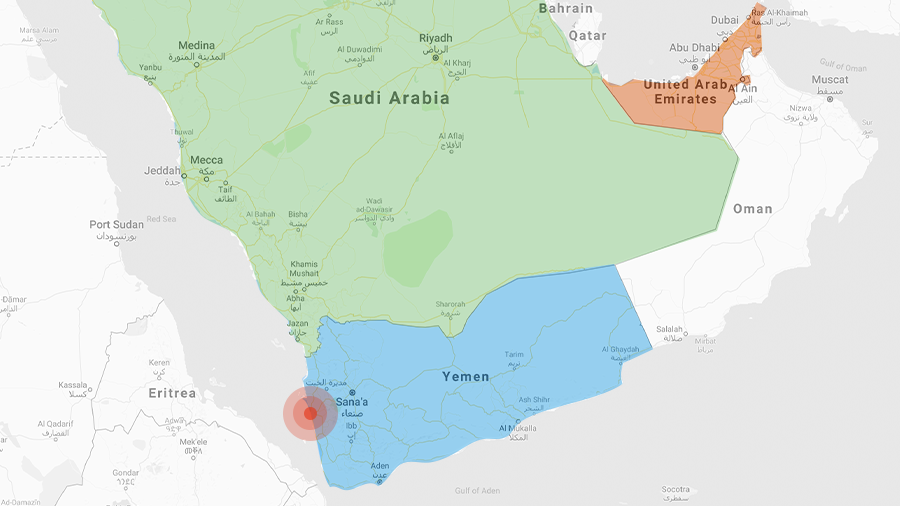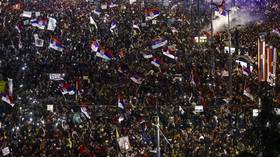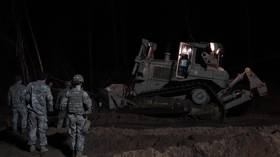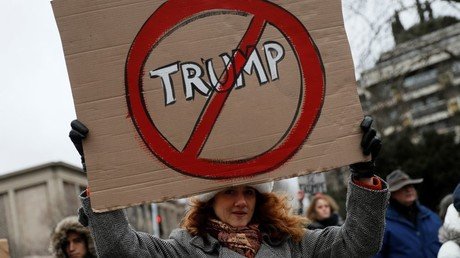Battle for Yemen's Hodeida: Why the Saudi-led 'Golden Victory' operation is taking so long
Saudi ground forces are too weak to stand up to the Houthis in Yemen, and their allies and proxies all have their own goals in mind – making the capture of the key port of Hodeida a strategic snarl, experts say.
The coalition offensive on Hodeida – a key port and a lifeline for Houthis and civilians alike – is codenamed 'Operation Golden Victory'. Rather telling, considering the vast amounts of money Saudi Arabia bundles into its military. Ironic, too: it would seem that with such massively superior military resources, the coalition should have stamped the Houthi rebels down within days.
Instead, the operation has been dragging on for months. It started in mid-June, then was paused until September for peace talks. Those eventually collapsed, and the fighting resumed. Now, coalition-backed ground forces are moving inside the city after a tense 11-day battle at the approaches. There are running battles in the streets and local hospitals are overflowing with civilians and militants alike; just one day of fighting claimed some 150 lives.

We asked several Middle East experts how, despite the enormous differences in military resources, the battle for Hodeida has become such a mess.
Coalition partners are reluctant
For one thing, many coalition members are unwilling to suffer losses for the gain of few. Yemen is a mess mostly started by the Saudis, and the Saudis are the ones standing to gain the most in terms of regional influence. The coalition comprises nine regional countries – but how often do we hear about players other than Saudi Arabia?
"A lot of the coalition's members are none too eager to go to battle on the ground in Yemen, to take losses, effectively to fight for Saudi Arabian interests. Egypt, in particular, is the most reluctant," says Boris Dolgov, a senior research fellow at the Institute of Oriental Studies of the Russian Academy of Sciences.
And the Saudis on their own can do little to budge the stalemate, he says.
"The unwillingness of coalition members to mount a ground intervention, and the inability of the Saudis to do it effectively, are what's causing the results we see."
Saudi ground forces are weak
For all its enormous war spending, the Saudi Arabian army is surprisingly weak on the ground, experts agree. They lack experience in the kind of toe-to-toe skirmishes the multiple Yemeni militias thrive on.
The mostly-Saudi forces fighting against Houthis are not too combat-effective… they've shown they are, to put it mildly, unable to handle Houthi forces
"Moreover, there have been cases where Houthi units crossed over into Saudi Arabia, and Saudi servicemen have died," Dolgov says.
That is why the Saudis have been relying on airstrikes so much – a problematic tool in itself, considering how unwilling and/or unable they have been to exercise any kind of precision, leading to massive civilian suffering. But it's one tool the Houthis have no real countermeasure for.
UAE's own goals
One coalition member, apart from Saudi Arabia, that has a palpable stake in Hodeida, is the United Arab Emirates. Having the port will allow the UAE to secure a powerful naval presence in the region.
"They have a goal of their own: they want to turn all ports in Yemen into their military bases. They've already taken Mukalla and Aden, they've created bases on the isles of Socotra and Perim. The last port not under their control is Hodeida," says Kirill Semyonov, the director of the Center of Islamic Studies at the Institute of Innovative Development
Having taken Hodeida, they will be fully dominant in the Gulf of Aden and the Bab-el-Mandeb strait.
The UAE have a much more effective ground force than Saudi Arabia, Semyonov says, but they've not been as prominent in the fight against Houthis, as they'd taken a detour to beat back Al-Qaeda forces in the region. Now that they are fully committed to taking Hodeida, they've hogged the entire operation.
Moving on the city from the north, the Saudis got bogged down at the approach – while the Emiratis, approaching from the south, have had considerably more success, gradually taking Hodeida block-by-block.
When Hodeida falls, proxy militias will turn on each other
For boots on the ground, Saudi Arabia and the UAE both have been heavily reliant on local militant warbands. And as the example of Libya has shown, that never spells a clean and clear-cut victory.
The proxies sponsored by the Saudis and the Emiratis have different ideologies – in particular, the UAE pals around with southern Yemeni separatists, who want South Yemen to become a separate nation again, as it used to be before 1990.
"There's a certain race, a rivalry even, which certainly doesn't help speed up the completion of the main objective, the capture of Hodeida. Houthi forces and their field commanders are actively capitalizing on that," says Grigory Lukyanov, a Middle East analyst and senior lecturer at the Russian Higher School of Economics.
And should they come head-to-head in Hodeida with the Houthis out of the way, it's going to get messy.
"If they come into contact, we can most likely expect more combat clashes like we've seen more than once in August and September, when these two groups either fought each other directly or set each other up under Houthi strikes," Lukyanov believes.
For these forces, there can be no sharing when it comes to who controls Hodeida.
For them, the capture of Hodeida is only possible if only one side is controlling it. They don't envision dividing the city between the groups.
About the only thing everyone in the coalition agrees on, is that they want Houthis gone. The cost so far seems to be the devastation of the city – and a possible new spiral of bloody succession wars.
Subscribe to RT newsletter to get stories the mainstream media won’t tell you.















